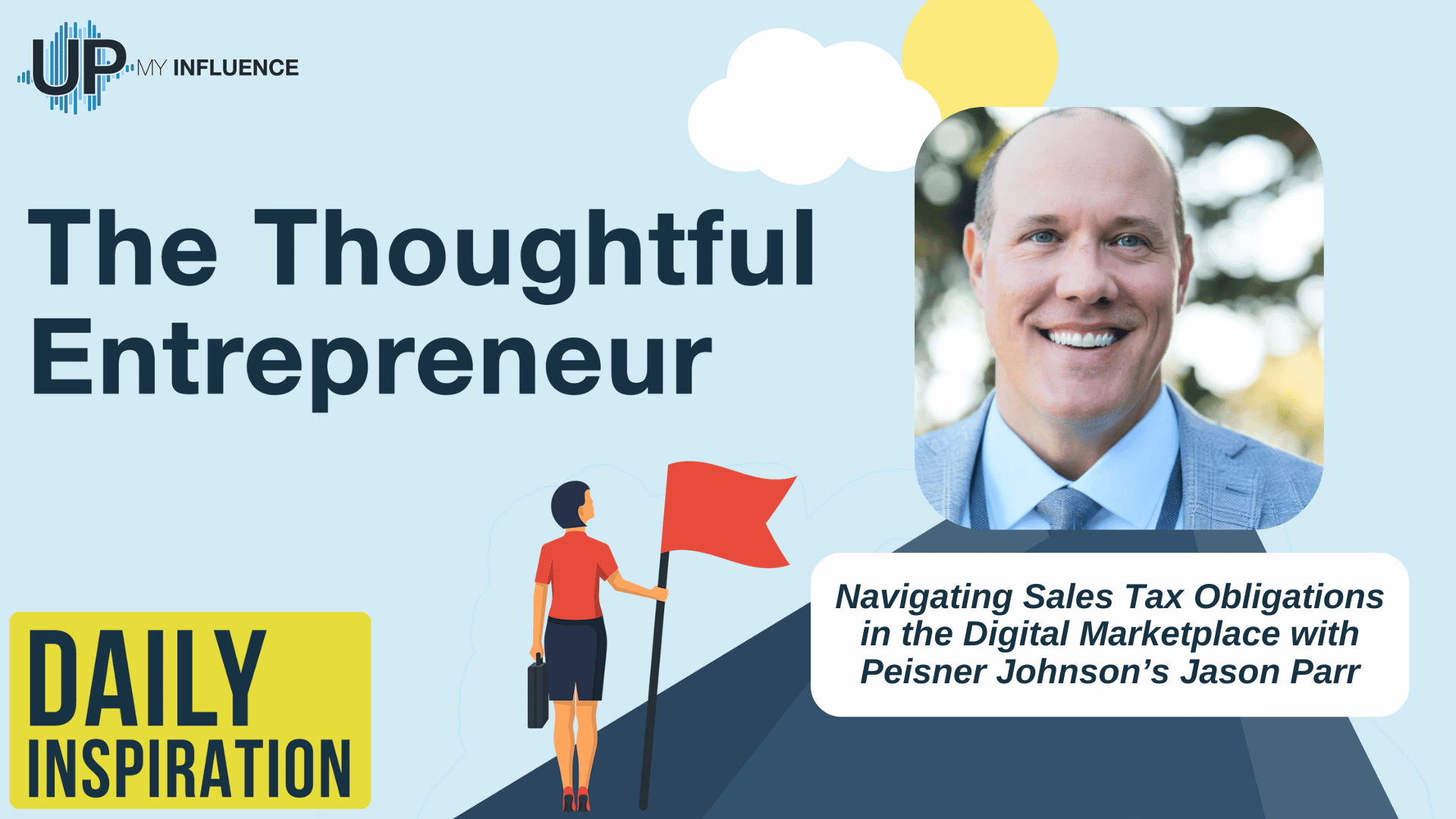THE THOUGHTFUL ENTREPRENEUR PODCAST
 Navigating Sales Tax in E-Commerce
Navigating Sales Tax in E-Commerce
In a recent episode of “The Thoughtful Entrepreneur,” host Josh delves into the intricate world of sales tax compliance with Jason Parr, the CEO of Peisner Johnson, also known as “The Sales Tax People.” This episode is a must-listen for e-commerce businesses grappling with the complexities of sales tax, especially in the wake of the 2018 Supreme Court case “Wayfair vs. South Dakota.” Below, we break down the key insights and actionable advice shared during the episode to help you navigate the often-confusing landscape of sales tax compliance.
Josh kicks off the episode by inviting listeners to explore his free video resource, which offers insights into generating business leads and partnerships. He emphasizes his extensive experience, having conversed with over 2,000 business leaders, and encourages listeners to visit his website, Up My Influence, for more information. Jason Parr, CEO of Peisner Johnson, joins the conversation. With 33 years of experience, Peisner Johnson has honed its focus on sales tax compliance over the past six years. Jason's expertise provides a deep dive into the challenges and solutions surrounding sales tax for e-commerce businesses.
The 2018 Supreme Court case “Wayfair vs. South Dakota” fundamentally changed the sales tax landscape. Prior to this ruling, businesses were only required to collect sales tax in states where they had a physical presence. The Wayfair decision established that businesses must now register and collect sales tax in states where they exceed certain sales thresholds, regardless of physical presence. This has significantly increased the complexity for e-commerce businesses, which may now have sales tax obligations in multiple states. Jason outlines three critical questions that every e-commerce business must consider to ensure sales tax compliance: Do I Have Nexus? Is What I Sell Taxable? Who is Selling the Product? Navigating sales tax can quickly become complicated, especially for rapidly expanding businesses.
About Jason Parr:
Jason has dedicated his career to helping companies find peace of mind when it comes to state and local tax (SALT), especially sales tax. He has been with Peisner Johnson, “The Sales Tax People”, for 27 years. He currently serves as the President and CEO, and has deep experience with all services offered by Peisner Johnson. Having “grown up” in the SALT arena, he has gained an expertise on how to navigate the sales tax issues and processes that keep owners, tax professionals, trusted advisors, and CPAs up at night. Peisner Johnson focuses its efforts on helping companies manage sales tax compliance, including sales tax return services, nexus studies/risk assessments, and getting registered properly, as well as, due diligence related to M&As, audit defense, research, automation, and tax recovery services. Parr lives in Dallas, and he and his wife of 32 years have 6 married children and 12 grandchildren. He enjoys golf, racquetball, ultimate frisbee, and a new favorite – pickleball.
About Peisner Johnson:
Peisner Johnson, founded in 1992, is a state and local tax consulting firm with a clear mission: Solve clients’ state tax problems. Because we focus exclusively on state and local taxes, we have developed a deep understanding of state tax issues. Our clients benefit from our extensive knowledge and experience and our client-first mentality. We have consulted with thousands of companies doing business across the United States and Canada in virtually every industry.
Apply to be a Guest on The Thoughtful Entrepreneur: https://go.upmyinfluence.com/podcast-guest
Links Mentioned in this Episode:
Want to learn more? Check out Peisner Johnson website at
Check out Peisner Johnson on LinkedIn at
https://www.linkedin.com/company/peisnerjohnson/
Check out Jason Parr on LinkedIn at
https://www.linkedin.com/in/jasonparrpjco/
Don’t forget to subscribe to The Thoughtful Entrepreneur and thank you for listening. Tune in next time!
More from UpMyInfluence:
We are actively booking guests for our The Thoughtful Entrepreneur. Schedule HERE.
Are you a 6-figure consultant? I’ve got high-level intros for you. Learn more here.
What is your #1 Lead Generation BLOCKER? Take my free quiz here.
Want to learn more about all the podcasts managed by UpMyInfluence? Opt in here.

